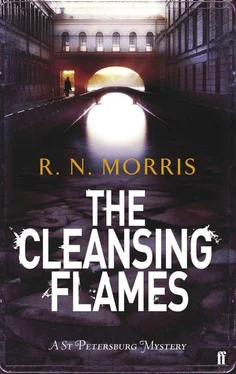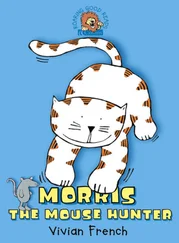R. Morris - The Cleansing Flames
Здесь есть возможность читать онлайн «R. Morris - The Cleansing Flames» весь текст электронной книги совершенно бесплатно (целиком полную версию без сокращений). В некоторых случаях можно слушать аудио, скачать через торрент в формате fb2 и присутствует краткое содержание. Год выпуска: 2011, ISBN: 2011, Издательство: Faber and Faber Fiction, Жанр: Исторический детектив, на английском языке. Описание произведения, (предисловие) а так же отзывы посетителей доступны на портале библиотеки ЛибКат.
- Название:The Cleansing Flames
- Автор:
- Издательство:Faber and Faber Fiction
- Жанр:
- Год:2011
- ISBN:0571259154
- Рейтинг книги:5 / 5. Голосов: 1
-
Избранное:Добавить в избранное
- Отзывы:
-
Ваша оценка:
- 100
- 1
- 2
- 3
- 4
- 5
The Cleansing Flames: краткое содержание, описание и аннотация
Предлагаем к чтению аннотацию, описание, краткое содержание или предисловие (зависит от того, что написал сам автор книги «The Cleansing Flames»). Если вы не нашли необходимую информацию о книге — напишите в комментариях, мы постараемся отыскать её.
The Cleansing Flames — читать онлайн бесплатно полную книгу (весь текст) целиком
Ниже представлен текст книги, разбитый по страницам. Система сохранения места последней прочитанной страницы, позволяет с удобством читать онлайн бесплатно книгу «The Cleansing Flames», без необходимости каждый раз заново искать на чём Вы остановились. Поставьте закладку, и сможете в любой момент перейти на страницу, на которой закончили чтение.
Интервал:
Закладка:
‘I am glad that we were able to be of service. We have provided a face for your nightmares.’
Prince Dolgoruky turned his attention to the semicircle of children watching, as if he had only just noticed them. He looked into their faces searchingly, addressing his words to them now: ‘It is not just my nightmares. Sometimes I can hear his step during the day, when I am awake. And when something moves in the shadows, I am sure it is him.’
Porfiry studied Prince Dolgoruky with narrowed eyes. It seemed he had at last begun to interest the magistrate.
An old obsession
‘What do you make of that?’ asked Porfiry as they stepped into the yard. He breathed deeply for a few moments and then lit a cigarette.
Virginsky answered with a question of his own: ‘Did he really not interest you at all?’
‘Oh, perhaps a little. But I did not want to give him the satisfaction of knowing it. There is something rather infantile about his desire to scandalise. He is like a little boy who wishes to be thought very wicked.’
‘So you do not consider him capable of any great crime?’
‘I consider him capable of great idiocy, which may well amount to the same thing. You noticed that he knew our man in the canal?’
‘Can you be sure?’
‘Oh absolutely. He is a bad liar. A simple “no” would have been more persuasive. Instead he had to work himself up over nightmares of the Devil and such like. He as good as confessed.’
‘ You think he killed our man? ’ Virginsky was astonished.
‘I think he may have had something to do with it, yes. As I think that Kozodavlev had something to do with it too.’
‘And what of this manifesto of crimes?’
‘It’s hard to say, without having seen it. But I would not be surprised if it turned out to catalogue every crime he has dreamed of committing but to omit the one crime of which he is actually guilty.’
‘I wonder that you can speak with such confidence on something that is necessarily a matter of conjecture.’
‘There is something cowardly and weak about him, I sensed. And yet also, a vileness that he is fully conscious of himself — and disgusted by. He plays with the idea of confession, as he does with that of wickedness. I would say he is torn by two contradictory impulses. The first, the desire to plumb the depths of his own evil, to commit the worst crime of which he can conceive. The second, the need for redemption, to achieve which he must confess his crimes — his true crimes, I mean. But before he is able to reach that point, his cowardice intervenes and subverts his intention. He has the boldness for wickedness but lacks the courage for salvation. At heart, he is a Christian, I think. And we must not forget that he is a Russian too. Yes. That is all it comes down to in the end. In many ways, he reminded me of myself. All investigation is ultimately self-investigation.’
Virginsky’s mouth gaped, but he was so far from formulating a response that all that came out was a strangulated gasp.
*
When they returned to Stolyarny Lane, Porfiry found Lieutenant Salytov waiting outside his chambers.
‘You wish to see me, Ilya Petrovich?’ Porfiry opened the door to admit them all.
‘I have seen him before,’ declared Salytov, intensely.
Porfiry and Virginsky exchanged a quizzical glance. ‘Seen. . whom, exactly?’
‘Him.’ Salytov pointed at the waxen face on the poster pinned to the wall.
‘Our drowned rat? Please, tell me more.’
‘Four years ago, I was investigating a revolutionary cell based in a confectioner’s on Nevsky Prospect. Ballet’s, the shop was called.’
‘But there was no revolutionary cell at Ballet’s!’ objected Virginsky, who was for some reason suddenly agitated.
Salytov directed the full force of his loathing towards the junior magistrate. ‘Is it not strange that my investigations were cut short by the bomb blast which accounted for this?’ Salytov swept a hand in front of his own face. It was the gesture of a stage magician, summoning up the disfigurement.
‘But that atrocity had nothing to do with the confectionery shop, as you know,’ insisted Virginsky. ‘You were following a false trail.’
‘This man.’ Salytov’s conjuring hand stabbed towards the poster emphatically. ‘I once saw this man in Ballet’s. He was mixed up in something, I am sure.’
‘ Mixed up in something! ’ mocked Virginsky.
Salytov’s stare snapped onto him once again. ‘My instincts have been proven correct, have they not? He would not have been killed and dumped in the canal if he were not mixed up in something.’
‘If it is the same fellow,’ muttered Virginsky sceptically.
‘Do you know his name?’ asked Porfiry, his tone smoothly appeasing.
Salytov hesitated. His gaze drooped, abashed. ‘No.’
‘But you are sure you saw him in Ballet’s?’
‘Yes. It was clear that he was an associate of the individual I was investigating, the lad Tolya. If you remember, Porfiry Petrovich, he was found with illegal manifestos in his possession.’
Porfiry wrinkled his face as he squeezed out his memory. ‘I do vaguely remember something about it. But I fear that Pavel Pavlovich is right. There was nothing in it. The boy had nothing to do with any revolutionary cell.’
‘That we could discover. At the time.’ Salytov’s doggedness was wearingly impressive.
Porfiry’s expression became momentarily pained. ‘Very well. Look into it. Talk to this Tolya. He may be able to supply a name, at least.’
Salytov clicked his heels and left the room in a series of quasi-military spins and steps.
‘That man. .’ began Virginsky.
‘. . is, at the moment, the only chance we have of identifying our corpse,’ completed Porfiry.
‘But do you not see, Porfiry Petrovich? The confectioner’s was an obsession with him. Is there not a danger that the same thing will happen again? Indeed, is it not simply the resurfacing of that old obsession that has prompted him to make this connection? I defy anyone to make a credible identification based on that photograph! Perhaps if it was someone you knew well, a husband, or a brother, or a close friend. But he is talking about a man he saw once in a confectionery shop four years ago. Are you not concerned that you are encouraging him in an unhealthy fixation?’
‘I repeat. At the moment, he is the only chance we have.’
*
Once again, the tallow candle was lit and the tin trunk pulled out from under the bed. Virginsky sat with his copy of ‘God the Nihilist’ in his hands. Its celebration of human reason rang hollow, as did its faith in the ascendancy of the human conscience. It seemed to assume that the two were identical, that if a man acted in accordance with his conscience it went without saying that he would be acting reasonably, and vice versa. But Virginsky had come to realise that they were very much at odds. One could reason out a course of action against which one’s conscience screamed rebellion.
Without knowing that he would do it, he tipped the tin trunk up, emptying the contents onto the floor. He stared sullenly at the unruly sprawl of ideas. Words and names jumped out at him, as if in retaliation for his childish petulance: ‘Saint-Simon’, ‘utopia’, ‘communism’, ‘phalanstery’, ‘freedom’, ‘the woman question’, ‘atheism’, ‘Bakunin’, ‘organisation’, ‘revolutionary’, ‘freedom’, ‘destruction’, ‘nihilist’, ‘Nechaev’. He sensed an escalation of intent, a hardening of resolve, leading right up to the ultimate phrase, the ruthless encapsulation of all the other radical concepts: the end justifies the means . It was a supremely reasonable formula.
The stove in his room was a fat white pillar bulging out from the corner. Two black cast iron doors were set into it close to the floor, one for access to the firebox, the other for cleaning beneath the grate. Virginsky knelt down and opened the larger door.
Читать дальшеИнтервал:
Закладка:
Похожие книги на «The Cleansing Flames»
Представляем Вашему вниманию похожие книги на «The Cleansing Flames» списком для выбора. Мы отобрали схожую по названию и смыслу литературу в надежде предоставить читателям больше вариантов отыскать новые, интересные, ещё непрочитанные произведения.
Обсуждение, отзывы о книге «The Cleansing Flames» и просто собственные мнения читателей. Оставьте ваши комментарии, напишите, что Вы думаете о произведении, его смысле или главных героях. Укажите что конкретно понравилось, а что нет, и почему Вы так считаете.












